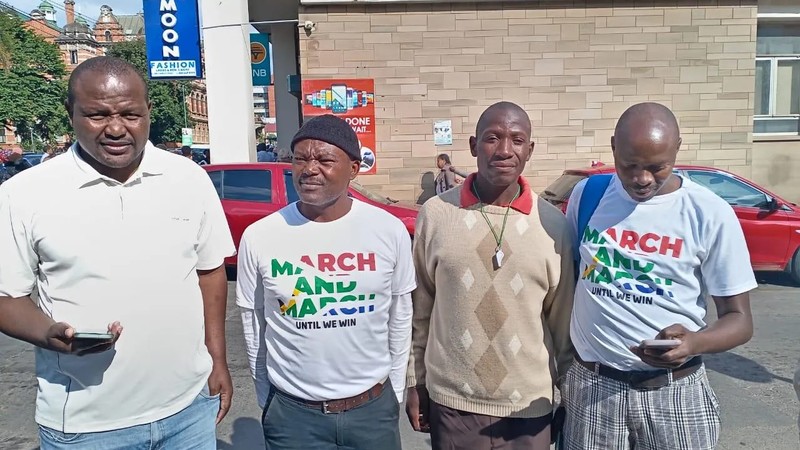FORMER radio personality Jacinta Zinhle MaNgobese Zuma’s newly established March and March Until We Win campaign against illegal immigrants is gaining traction around the country while being allegedly shunned by the government.
On social media, ordinary South Africans have expressed their support for MaNgobese Zuma’s campaign.
However, she expressed concern about the government departments’ lack of support.
MaNgobese Zuma, who also enjoys support from ActionSA, said the national police and KwaZulu-Natal Premier Thami Ntuli, were the only ones not hostile and who were willing to hear her concerns.
“Otherwise, all the other departments are very, very hostile when we try to work with them.
“We write letters without getting responses, we try to facilitate engagements, we don’t get feedback from them, and we tried reaching out to the president,” she said.
She spoke to this reporter telephonically on Thursday after a group of her supporters picketed outside the Pietermaritzburg Magistrate Court where a suspect, who was believed to be from Malawi, had appeared for allegedly raping a 10-year-old girl from Copesville.
Although she welcomed Ntuli’s campaign against illegal immigrants, she stated that this was not sufficient.
“My point is that you cannot do something once off and keep quiet for three months because the situation is dire and requires serious intervention,” she said.
She wanted President Cyril Ramaphosa to declare a state of emergency against illegal foreigners and deploy the army to assist the police in flushing them out of the country.
“The police cannot do this by themselves, as they are already overwhelmed.
“Our courts and the national defence force need to play their parts,” she said.
She called on the South African citizens to assist by stopping to rent out spaces in their homes to the illegal immigrants to open spaza shops.
MaNgobese Zuma described the issue of illegal immigrants as the country’s crisis that has depleted already scarce resources earmarked for the local citizens.
She said there was no way that the government could misinterpret the March and March campaign as xenophobic because it was supported by legal foreigners who understood the situation.
She said the crisis was clear because people were losing their jobs as companies were opting to employ illegal foreigners.
“We state all those things in our communication with the departments, and if they keep ignoring us, things are going to get worse.
“Look at the health department, people complain about overcrowded clinics and hospitals, leading to the lack of access to healthcare, and that leads to more tension on the ground.
“We recently saw a report from ActionSA stating that 70% of the files at the Department of Health in Johannesburg belonged to foreigners, and that speaks to the situation that is not healthy,” she said.
Responding to ActionSA MP Dr Kgosietsile Letlape’s parliamentary questions last year, Public Service and Administration Minister Inkosi Mzamo Buthelezi said out of 12 million employees of government departments nationally and various provinces, more than 6,000 were foreign nationals.
MaNgobese Zuma said she started the March and March campaign on March 24 this year after realising the future of young South Africans was bleak.
“I was inspired by looking at the future of this country and seeing the pain from thinking of my poor children of South Africa, where they can no longer be able to go outside and play because there is kidnapping, human trafficking, and drugs.
“The youth of South Africa don’t have jobs,” said MaNgobese Zuma.
She alleged that illegal immigrants were contributing to the high crime rate.
“They are armed to the teeth with all kinds of ammunition and guns, and there is even a spaza shop mafia run by Pakistanis and Somalians, and when South Africans try to open a shop, it becomes a crisis.
“How is that even possible that a country cannot allow its citizens to open spaza shops?” she said.
According to the Home Affairs website, the department deported close to 47,000 illegal immigrants in the 2024/2025 financial year alone.
In a statement issued on April 2, Home Affairs Minister Dr Leon Schreiber described the country’s deportation rate, which he linked to improved working relationships between his department, the Border Management Authority and police, as having improved than the previous years.
“The fact that Home Affairs now performs more than double the number of deportations conducted in a country like France, which has the highest rate of deportations in the European Union, sends a clear message to offenders that the days of impunity are over.
This improved performance, coupled with our digital transformation reforms that will automate entry and exit to prevent people from entering the country illegally through our ports of entry, is contributing to enhanced national security and trade facilitation,” said Schreiber.
